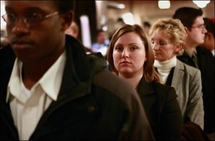Women to take to employment helm in the US
Virginie Montet
WASHINGTON (AFP) - Women in the United States may soon, for the first time, hold more jobs than men, if the economic crisis continues to eliminate jobs in male-dominated industries, according to experts.
With the Labor Department announcing on Friday that 3.6 million jobs have been lost in the United States since late 2007, women have come within a hair's breadth of becoming the most active segment of the population.

Citing December 2008 figures, which do not include farm jobs, Kelter said 49.3 percent employees are women.
As the real estate bubble burst, construction and manufacturing jobs were the first to be shed, both sectors that are more likely to employ men.
Last month, when the manufacturing and construction sectors lost 207,000 and 111,000 jobs each, the health and private education sectors, which are dominated by women, created an average of 30,000 jobs each.
"Men have been hit much harder than women ... Although women have lost jobs, men have lost many more," economist Heather Boushey of the Center for American Progress said in an interview.
"There are fewer men at work in the US today than there have ever been at any point in time," she added, saying that only 69.2 percent of men now have a job, "lower than it has ever been."
In recent years, women have found job opportunities readily available in sectors like health and local government.
But women have also been hit by the economic downturn. Since the onset of the recession, unemployment has also grown for women, reaching 6.2 percent in January, up from 4.3 percent in December 2007.
Men have suffered a far greater setback, with unemployment growing by 3.2 points to reach 7.6 percent, up from 4.4 percent two years earlier.
That is a break with the past. In recessions prior to 1980, women's unemployment rose faster than that of men, Boushey noted, adding that this recession appears to continue a reverse trend that began in the 1980s.
"There has been only one other time since 1949 that men's unemployment has been this much higher that women's, in 1983 at the height of the high unemployment of the early 1980s recession," Boushey wrote in a report.
"If we don't pass the economic recovery package, we may see a very large job loss among women as cities and local governments lay off workers who are disproportionately women," she added, referring to the massive economic stimulus package currently working its way through Congress.
"As women increasingly take on the role of breadwinner, ensuring that they get a fair wage is taking on more urgency than ever before," said Boushey, noting that among full-time workers, women earn only 78 cents for every dollar a man earns.
-----------------------------------------------------
Image of job seekers waiting in line at a job fair in Chicago, Illinois, by Scott Olson.